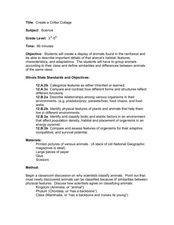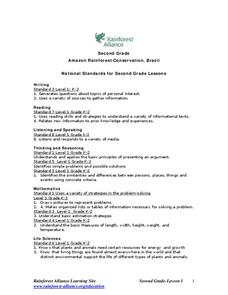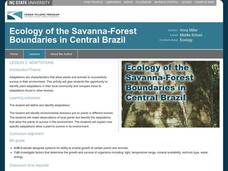Curated OER
Patterns and Adaptations in Plants and Animals
Fourth graders conduct research about some of the regions of Texas. They compare plants and animals to identify different adaptations. The statistics of survival rates are measured for changes.
Curated OER
Animals
First graders study the basic needs of animals and compare them to human needs. They make bird feeders using milk carton and pine cones. They review the basic needs of food, water, air, and shelter and discuss what happens when animals...
Curated OER
Critters in Your Own Backyard
Students identify various animals and their habitats, as well as their specific traits In this animal habitat lesson, students list animals they've seen in their backyard. Students select one animal and do research. Students then answer...
Curated OER
COMPARE SOILS BY GROWING PLANTS
The student will identify the difference in the rate of plant growth in three soils that vary in organic matter.1. Obtain three to four flowerpots, different types of soil, a record chart, three to five beans for each pot, and water....
Curated OER
What Do You Know About the Birds Around You?
Students compare and contrast various species of birds. After participating in a brief discussion of the characteristics of birds, they view birds in their natural habitat and in pictures with a focus on the similarities and differences...
Curated OER
Temperate Forests vs. Wetlands
Learners compare and contrast the temperate forest and wetlands by researching them in groups. In this forest lesson plan, students identify the economic, ecological, and social benefits of each.
Curated OER
Create a Critter Collage
Young scholars create a collage. In this animal classification lesson, students discuss why and how scientists classify animals. Young scholars view pictures of different animals and decide which class each animal belongs to. Students...
Curated OER
Habitats of the World
Students discover that the Earth supports many different animal habitats. In this habitat lesson students research different habitats of the world. Students show how the animals in their habitat are adapted.
Curated OER
What Makes a Cat a Cat?
Students investigate the lives of pets by videotaping them. In this animal life lesson plan, students videotape a cat and other pets using school cameras in a computer lab. Students review the footage from the cat and other...
Curated OER
Fall vs. Spring
Students compare fall and spring. In this seasonal changes lesson, students read the book Apples and Pumpkins and discuss the fall season. The students then read It's Spring and describe the spring season. As a culminating activity,...
Curated OER
Habitat Basics
First graders get out and explore two different habitats to examine how each one meets the needs of the plants and animals that dwell there. They discuss what they've learned about animal habitats as they explore the outdoor environment....
Curated OER
Plants and Animals Depend Upon One Another
First graders study plants and animals and how they depend on one another. They also study that plants give energy to animals and provide oxygen needed for life. Finally, 1st graders give examples of the roles plants and animals play...
Curated OER
Co-evolution of Plants and Pollinators
Students, while studying the rolls of pollinators and plants, explore co-evolution of mutualistic relationships.
Curated OER
Changing Weather: Comparing Climate from Voyageur Times to Today
Fifth graders compare climates. In this weather lesson, 5th graders observe and record weather observations and discuss the impact of weather on people. Students also discuss the concept of global warming and determine how weather...
K5 Learning
The Life Cycle
Studying plant, animal, or insect life cycles? Pair a science unit with a reading comprehension worksheet on life cycles. The passage touches briefly on butterfly, plant, frog, and dog life cycles before prompting readers to answer six...
PBS
Season Seeking
It's a time of change. A hands-on activity engages young scientists in a lesson highlighting the change of seasons. They brainstorm indicators of season changes in nature and then look for them. Next, they record observations in a field...
Curated OER
Amazon Rainforest Conservation, Brazil
Students explore rain forests. In this rain forest lesson, students participate in a "BioBlitz" of their schoolyard, observing and recording every living thing in a designated area. Students visit websites about rain forests...
University of New Mexico
New Mexico Land of Enchantment
Third graders research Native American Cultures surrounding New Mexico. They analyze the history and geography of the state. They play a guessing game that incorporates the indigenous plants and animals of New Mexico. In groups, learners...
Curated OER
Living Sources of Weathering
In this sources of weathering worksheet, students read about the various things that cause weathering including plants and animals. They answer four critical thinking questions about weathering.
Curated OER
Adaptations
Sixth graders identify plant adaptations. For this adaptations lesson, 6th graders use digital cameras to photograph plants found on their campus. Students describe the adaptations for each plant.
Curated OER
"Garden Springs Gardeners"
First graders ponder the question of how plants help their lives. They observe and compare properties of several different plants. Differentiate between living organisms and nonliving objects.
Curated OER
It's Challenging Being Green!
Students influence the plant life cycle as they take care of plants.In this caring for plants lesson, students understand the parts of the plant and their functions in keeping it alive. Students participate in experiments with plants and...
Curated OER
Soak it up
Students complete a hands on activity using hard boiled eggs, food coloring, tape, cups, water, and a knife to show how permeability affects animals. For this permeability lesson plan, students complete this activity and learn how...
Curated OER
The Five Kingdoms
An overview of the five kingdoms within the biological classification system is presented in this set of five slides. The first lists the objectives of the slide show, and the second gives general characteristics of plant, animal, and...

























